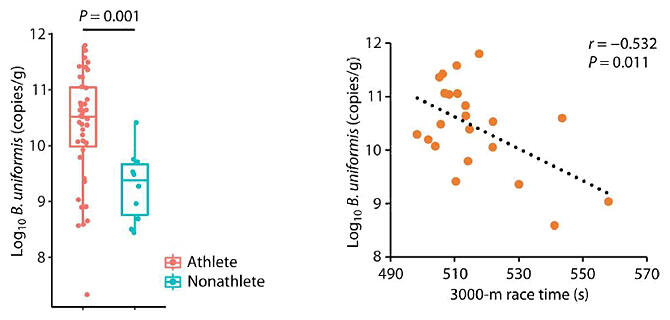Microbial populations in the human intestine are composed of a variety of bacteria which are known as gut microbiota and have been said to significantly impact health and disease. It is known that the gut microbiota of top athletes is highly diverse; however, the association of this microbiota with exercise performance and its mechanisms remain unclear.
Project Professor Shinji Fukuda of the Institute for Advanced Biosciences (IAB) at Keio University compared the gut microbiota of 48 male athletes on the long‐distance runner of Aoyama Gakuin University and that of 10 men in the control group of the same ages. They found that Bacteroides uniformis (B. uniformis), one of a major gut microbiota genera, was more abundant in the athlete group than in the control group. The researchers further revealed that a higher level of the bacteria correlated with a faster time in a 3,000‐meter run.
In addition, when the 10 men in the control group aged between 20 and 40 years who had a habit of exercise took a supplement containing α‐cyclodextrin, a cyclic oligosaccharide that is a nutritional source of B. uniformis, for eight weeks, their bike exercise test times were shortened by approximately 10%. Moreover, the level of fatigue immediately after riding was substantially reduced. In contrast, a placebo that did not contain cyclic oligosaccharides exhibited no effect. Furthermore, the results of animal exercise tests suggested that short‐chain fatty acids, such as acetate and propionate produced in the intestine by B. uniformis, promote glycogenolysis and gluconeogenesis in the liver, supplying the whole body with the glucose necessary for exercise.
These results indicate the possibility that consuming food favored by gut microbiota can promote the production of short‐chain fatty acids to improve endurance exercise performance. The use of cyclic oligosaccharides in sports, food and beverages may be beneficial in the future.
Number of intestinal Bacteroides uniformis in athletes and in males in the control group (left), and Influence of Bacteroides uniformis bacterial count on the duration required to run 3,000 meters in the athlete group (copy number/g) (right).

Original article was provided by the Science Portal and has been translated by Science Japan.




